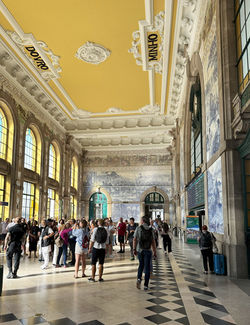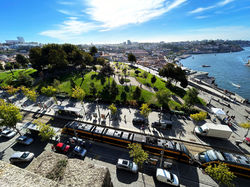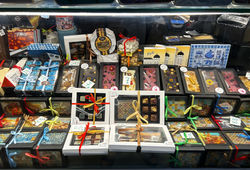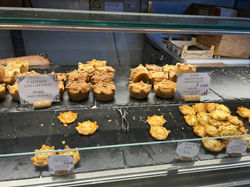
Portugal | Porto
 Miles of golden beaches and long days of plentiful sunshine can be found in Praia D'el Rey. |
|---|
 A traditional Portuguese almond cookie |  Fresh octopus is so delicious |
|---|
 |
|---|
The shrine of Our Lady of Nazareth is found in the village of Nazare on the Atlantic coast of Portugal. The village is named after this miraculous statue of Mary and the Christ Child that was brought here many centuries ago. According to tradition, it was carved by the hands of St. Joseph. Later the faces and hands were painted by St. Luke the Evangelist. The statue came from the Holy Land where it was one of the oldest images venerated by Christians. It was saved from destruction sometime early in the 5th century by a monk named Ciriaco, who gave the statue to St. Jerome. St. Jerome later gave it to St. Augustine in Africa, to protect the statue by removing it from the Holy Land. St. Augustint then gave it into the safekeeping of the monastery of Cauliniana, near Merida, a monastery in the Iberian peninsula.
 Nazare is a popular surfing destination because of the high breaking waves that form due to the presence of the underwater Nazare Canyon. This located is reported to have the largest waves in the world and many surfing records have been set here. |  The Biggest Waves in the World |
|---|
 The Clerigos Tower is visible from almost all areas of Porto. Construction of the tower itself was completed in 1763 and when completed was the tallest building in Portugal. 230 steps over 6 levels ascend 249 feet to the belfry and offer visitors panoramic view of the city and the river below. Construction of the church itself took place between 1732 and 1750, a Baroque work of Nasoni ( who is buried there ). It was Portugal's first elliptical shaped church. |  Part of the Pipe Organ in the choir section of Clerigos Church |  A Side Altar in the Church |
|---|---|---|
 Church Artiface |
 The mission of the center is to popularize and enable the developement of photographic art in Portugal. It is home to over 60 collections. |
|---|
 Porto is known for its beautiful tiles called azulejos and their use in Portugal dates back to the 13th century. They were brought to Portugal by Moorish invaders from North Africa. The practice of covering buildings with tiles became a status symbol. Portugal was incredibly wealthy due to their success in exploration and they used some of that wealth to decorate walls, ceilings and facades of both their private and public buildings in beautiful azulejos. |  In English this fountain is known as the Fountain of Lions and gives brightness and color to the Square. |  Mom in front of the Fountain of Lions |
|---|
 |  Detail of the Carmo church facade |
|---|
Located in downtown Porto, the Carmo and Carmelitas churches look like the biggest church in the city. Yjeu are actually two churches separated by one of the world's narrowest houses. This house was built to make all contact between the monks and the nuns impossible. Carmelitas church, on the left, was part of a convent in the 17th century. The church was used as barracks during the French invasion of Porto (1808 - 1814). A mass service was being held when we were there to view the Carmelita's church. The Carmo church is now a museum.
 The Hidden House - one of the narrowest houses in the world |
|---|
 The main altar in the Carmelita's church |  Commemoration of Our Lady of Fatima |
|---|
 Livararia Lello is one of the most beautiful bookstores in the world with its intricate neo-gothic and art nouveau design. Inaugarated in 1906, It is one of Portugal's oldest bookstores. Its most famous for its iconic wooden staircase with its elegant curves and large stained glass windows. The bookstore is also said to have inspired the creation of Hogwarts in the Harry Potter series. |
|---|
 Porto Sao Bento is one of the world's most outstanding train stations. It opened in 1903 and got its name from the Benedict Monastery that stood exactly on the same spot. It is a true art gallery with over 20,000 azulejo tiles in the main hall that depict the eventful history of Portugal. |  Tiled walls depicting the history of Portugal |  Beautiful Tiles |
|---|---|---|
 More of the tiled walls |  History on its walls |  Shannon and our guide perusing the walls |
 Yes as beautiful as it is................It is a working train station |
 The Bishop's Palace or Episcopal Palace is the official residence of the bishops of Porto, Portugal. The Palace is located on a high elevation near the Porto Cathedral. |  The area of Porto where the Porto Cathedral is located offers up a nice view of the city itself. |  The Porto Cathedral is a Roman Catholic Church located in the historical center of the city of Porto. It is one of the city's oldest monuments and one of the most important local Romaneque monuments. It is a symbol of Portuguese history and culture. |
|---|---|---|
 The pillory of Porto is a long twisting stone pillory dating from the 18th century |  Looking down on the Douro River |  View of the park |
 The train bridge and a walking bridge |  These were the first form of transportation for the grapes from the Douro Valley to Guaia across from Porto. They are flat bottomed boats called rabelos. |  The Douro River |
 The Monastery of Serra do Pilar is a former monastery located in Guia on the opposite side of the Douro River from Porto. It is noted for its church and cloister, both of which are circular. |
|---|
 Churchills Port is a port wine company founded in 1891 by John Graham, who named the company after his wife Caroline Churchill. John and his two brothers Anthony and William are from the Grahams Port family who have produced wine in the Douro Valley for over 200 years. |  A Special Vintage |  97 Points |
|---|---|---|
 Inside Churchills |  Time to taste port |  Thanking our guide Manuel |
 |  Overview of the market - all under cover |
|---|
The Mercado do Bolhau is located in the center of the city and is a must-see place to visit in Porto. You will find fresh produce , meat, fish and flowers. The market dates back to 1839 , when the town hall bought the land where the market now stands and designated the area as a market. The neoclassic building that now exists divided the market into two floors. It was built in 1914. In Bolhau market you'll find women selling their products with something like an outcry. They call it "pregao" and each one has their own.
 Seaweed choices |  Spices anyone? |  Maybe some flowers |
|---|---|---|
 Tempted to buy sardines |  Maybe you are enticed by Olive Oil |  Olive Selection |
 A Personal Favorite............Cheese |  Ooh more cheese |
 Chocolates |  Sausage selection |  Desserts |
|---|---|---|
 Savory pies |  Less selection by the end of the day |  Portuguese poultry with turnip greens |
 Lots of fruit |  Different colored Dragon Fruit |
 A great fresh seafood restaurant in Porto |  Plate of Shellfish |
|---|
 Crest for a Winery in Douro Valley |  Could not resist taking a photo of this cute winery kitty. |  Shannon with grapes from the vineyard |
|---|---|---|
 View of the grapes |  Tasting the difference |  Beautiful day.....gorgeous view |
 Port wine, also known as vinho do Porto is a Portuguese fortified wine produced in the Douro Valley of northern Portugal. It is typically a sweet red wine, often served with desserts. although it also comes in dry, semi-dry and white varieties. Other port styled wines are produced outside of Portugal but under the European Union Protected Designation of origin Guidelines, only wines from Portugal are allowed to be labelled "port". |  Casa dos Barros is an existing winery with a restaurant and a lovely view of the vineyards |  Inside Casa dos Barros |
|---|---|---|
 Originally made for grape stomping and now a boutique winery and restaurant |  Inside Decor |  Beautiful grounds of Casa dos Barros |
 On-site Chapel |
 This is the home of Ferdinand Magellan. He was born in northern Portugal c 1480. He was a Portuguese explorer best known for having planned and led the 1519 Spanish expedition to the East Indies across the Pacific Ocean to open a maritime trade route. He discovered the interoceanic passge now bearing his name and achieved the first European passage to Asia via the Pacific. |  Magellans' home in Douro Valley |  At Magellans' House |
|---|
 Stretching over 373 miles, the Douro Valley is a large historic and cultural region of Portugal, long devoted to vineyards and to the production of some of the world's best wines. It has been disignated by UNESCO as a World Heritage Site and is incredibly beautiful. |  Two sisters in Douro Valley together |  On the Douro River |
|---|---|---|
 Changing colors |  This is where we embarked from... |
 Another port tasting venue |  Who knew that we would end up on a tour of Douro Valley and meet people living in our original home town of Spokane, Washington. It really is a small world. |
|---|